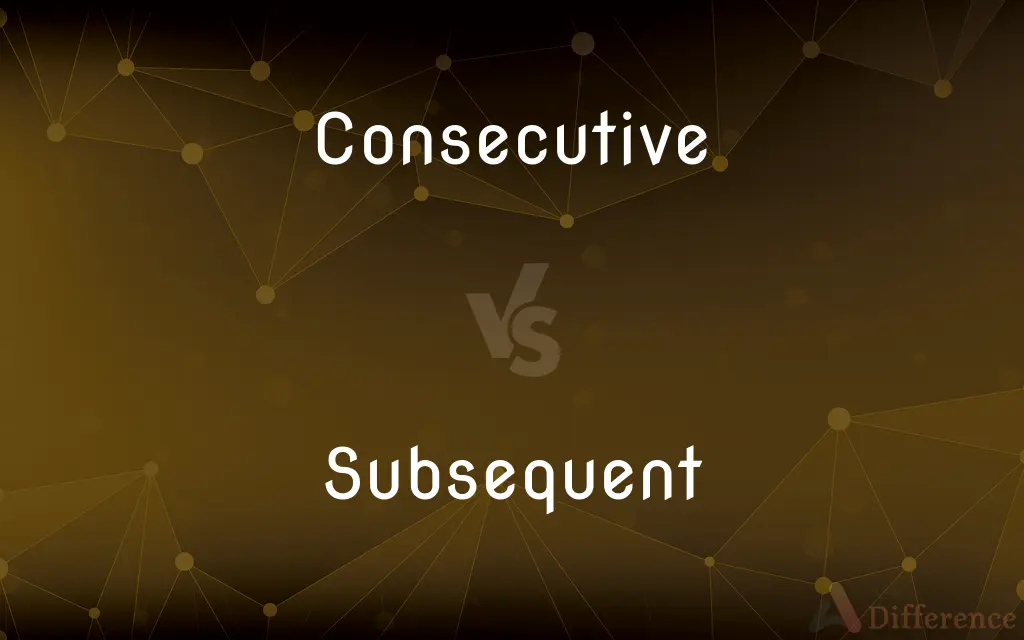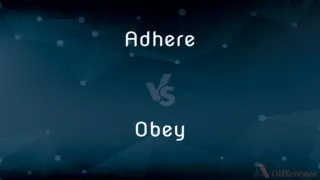Consecutive vs. Subsequent — What's the Difference?
By Maham Liaqat & Urooj Arif — Updated on March 16, 2024
Consecutive refers to events happening one after another without interruption, while subsequent denotes events following in order, but not necessarily without a break.

Difference Between Consecutive and Subsequent
Table of Contents
ADVERTISEMENT
Key Differences
Consecutive implies a sequence where events or items follow one directly after the other without any gap. For example, consecutive days mean Monday is followed by Tuesday, which is followed by Wednesday, illustrating a continuous, uninterrupted sequence. On the other hand, subsequent refers to something coming after something else in time, but it does not specify that the events occur immediately one after the other or without any gap between them.
When talking about numbers, consecutive numbers are integers that follow in direct sequence without any numbers missing in between, such as 1, 2, 3, 4, 5. Whereas subsequent numbers refer to numbers that follow one another but may include gaps or may not be in direct sequence, such as 1, 3, 5, 7, indicating a following sequence but not a side-by-side placement.
In the context of events, consecutive events happen one right after the other, such as consecutive meetings where one meeting starts immediately after the previous one ends. Subsequent events, however, are those that follow others but may have a time lapse between them. For instance, a subsequent meeting might occur the day after the initial meeting, not immediately following it.
The concept of consecutiveness also implies a kind of exclusivity in terms of immediate succession, commonly used in sports or competitions to denote achievements achieved in direct succession, like winning a championship in consecutive years. Subsequent achievements are achievements that follow previous ones but are not required to be within consecutive time periods.
Understanding the difference between consecutive and subsequent is crucial for clear communication, especially in legal, academic, and professional contexts. Using the term consecutive suggests a direct, uninterrupted continuation, while using subsequent allows for the possibility of intervening events or time periods between the referenced points.
ADVERTISEMENT
Comparison Chart
Meaning
Following continuously without interruption.
Following in order but not necessarily without interruption.
Usage in Sequence
Direct sequence without gaps.
Orderly sequence, possibly with gaps.
Example in Numbers
1, 2, 3 (no gaps).
1, 3, 5 (ordered but with gaps).
Application in Events
Events happening back-to-back.
Events following each other, not necessarily immediately.
Implication
Implies direct succession.
Implies following but allows for breaks.
Compare with Definitions
Consecutive
Events or numbers following one after another without interruption.
She attended three consecutive meetings, each starting right after the previous one ended.
Subsequent
Following in time or order, not necessarily immediately or without interruption.
The subsequent chapters of the book delve into more complex concepts.
Consecutive
Refers to integers that follow each other directly.
Consecutive integers, such as 6, 7, 8, are used in mathematical proofs.
Subsequent
Can apply to any sequence where one item follows another.
Subsequent discussions led to the resolution of many initial misunderstandings.
Consecutive
Common in discussions about sequences or series in time.
The experiment involved taking measurements on five consecutive days.
Subsequent
Allows for intervening events or time.
Subsequent amendments to the law addressed the loopholes in the original legislation.
Consecutive
Often used to emphasize uninterrupted sequences or streaks.
The team won four consecutive games, showcasing their dominance.
Subsequent
Used to describe events or items that come after others.
His subsequent work was more innovative but less commercially successful.
Consecutive
Indicates a direct continuation.
Consecutive sentences in criminal law can lead to a longer time in prison.
Subsequent
Implies a following sequence but not directly consecutive.
Subsequent prime numbers, like 11, 13, and 17, follow each other but are separated by non-prime numbers.
Consecutive
Following each other continuously
Five consecutive months of serious decline
Subsequent
Following in time or order; succeeding.
Consecutive
Expressing consequence or result
A consecutive clause
Subsequent
Following in time; coming or being after something else at any time, indefinitely.
Growth was dampened by a softening of the global economy in 2001, but picked up in the subsequent years due to strong growth in China.
Consecutive
Denoting intervals of the same kind (especially fifths or octaves) occurring in succession between two parts or voices.
Subsequent
Following in order of place; succeeding.
Consecutive
Following one after another without interruption; successive
Was absent on three consecutive days.
Won five consecutive games on the road.
Subsequent
Following a line in the earth that is more easily eroded.
Consecutive
Marked by logical sequence.
Subsequent
(geology) A subsequent stream or faultline.
Consecutive
(Grammar) Expressing consequence or result
A consecutive clause.
Subsequent
Following in time; coming or being after something else at any time, indefinitely; as, subsequent events; subsequent ages or years; a period long subsequent to the foundation of Rome.
Consecutive
Following, in succession, without interruption
Subsequent
Following in order of place; succeeding; as, a subsequent clause in a treaty.
Consecutive
Having some logical sequence
Subsequent
Following in time or order;
Subsequent developments
Consecutive
A sequence of notes or chords that results from repeated shifts in pitch of the same interval.
Consecutive
A linguistic form that implies or describes an event that follows temporally from another.
Consecutive
Consecutive interpretation.
Consecutive
Following in a train; succeeding one another in a regular order; successive; uninterrupted in course or succession; with no interval or break; as, fifty consecutive years.
Consecutive
Following as a consequence or result; actually or logically dependent; consequential; succeeding.
The actions of a man consecutive to volition.
Consecutive
Having similarity of sequence; - said of certain parallel progressions of two parts in a piece of harmony; as, consecutive fifths, or consecutive octaves, which are forbidden.
Consecutive
In regular succession without gaps;
Serial concerts
Consecutive
Successive (without a break);
Sick for five straight days
Consecutive
One after the other;
Back-to-back home runs
Consecutive
In a consecutive manner;
We numbered the papers consecutively
Common Curiosities
What does it mean if events are consecutive?
If events are consecutive, they occur one right after the other without any gap in between.
Can a series of events be both consecutive and subsequent?
Yes, a series of events can be both consecutive and subsequent if they follow one another directly and in order, without any intervening events.
Can subsequent events have gaps between them?
Yes, subsequent events can have gaps between them; they follow each other in order but not necessarily without interruption.
How do consecutive numbers differ from subsequent numbers?
Consecutive numbers follow directly with no gaps (e.g., 1, 2, 3), while subsequent numbers follow in order but may have gaps (e.g., 2, 4, 6).
Can months be considered consecutive?
Yes, months can be considered consecutive if they follow one right after the other without skipping any months, for example, February is consecutive to January.
How do consecutive hours work in scheduling?
Consecutive hours in scheduling mean that the hours follow one directly after the other without breaks, such as a meeting scheduled from 1 PM to 3 PM covering two consecutive hours.
Is there a difference in usage of consecutive and subsequent in scientific research?
In scientific research, consecutive often refers to uninterrupted sequences of events or samples, whereas subsequent may refer to related findings or steps that follow, regardless of immediate succession.
How can subsequent actions influence outcomes?
Subsequent actions can influence outcomes by following previous actions with additional measures or responses, which can alter or build upon the initial results.
Are all subsequent numbers part of a consecutive sequence?
No, not all subsequent numbers are part of a consecutive sequence because subsequent numbers can skip values in between, unlike consecutive numbers which directly follow one another.
In legal terms, what's the difference between consecutive and subsequent sentences?
Consecutive sentences are served one after the other without overlap, whereas subsequent sentences or considerations follow earlier ones but are not specifically about the sequence of serving time.
Can sports events be consecutive?
Yes, sports events can be consecutive if they occur on immediately following days or times, such as back-to-back games over a weekend.
Can consecutive events ever include a break or interruption?
By definition, consecutive events should not include breaks or interruptions; they occur one right after another.
What is an example of consecutive days?
Consecutive days refer to days that follow one directly after another, such as Tuesday following Monday, without skipping any days in between.
What role do consecutive and subsequent play in narrative storytelling?
In narrative storytelling, consecutive events drive the plot forward without interruption, creating a sense of immediacy and continuity, while subsequent events can develop the story across broader time frames, allowing for growth, change, and anticipation between key moments.
What does it mean when laws are passed in subsequent years?
When laws are passed in subsequent years, it means they are enacted in years following each other, but not necessarily in direct succession or every single year.
Share Your Discovery

Previous Comparison
Success vs. Victory
Next Comparison
Adhere vs. ObeyAuthor Spotlight
Written by
Maham LiaqatCo-written by
Urooj ArifUrooj is a skilled content writer at Ask Difference, known for her exceptional ability to simplify complex topics into engaging and informative content. With a passion for research and a flair for clear, concise writing, she consistently delivers articles that resonate with our diverse audience.













































